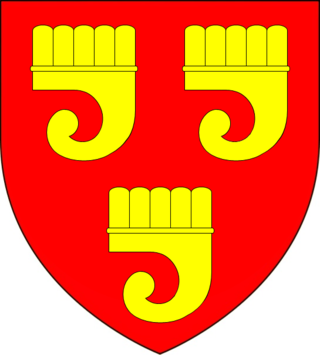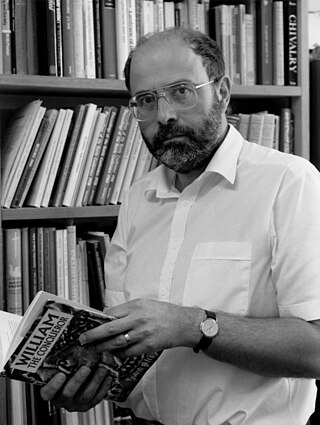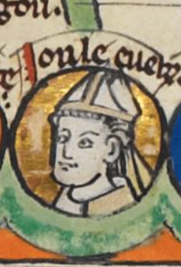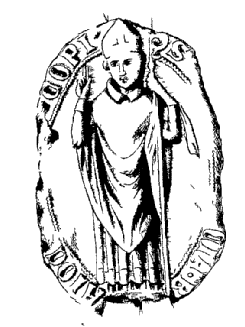Related Research Articles

Robert FitzRoy, 1st Earl of Gloucester was an illegitimate son of King Henry I of England. He was the half-brother of the Empress Matilda, and her chief military supporter during the civil war known as the Anarchy, in which she vied with Stephen of Blois for the throne of England.

Charles de Marguetel de Saint-Denis, seigneur de Saint-Évremond was a French soldier, hedonist, essayist and literary critic. After 1661, he lived in exile, mainly in England, as a consequence of his attack on French policy at the time of the Peace of the Pyrenees (1659). He is buried in Poets' Corner, Westminster Abbey. He wrote for his friends and did not intend his work to be published, although a few of his pieces were leaked in his lifetime. The first full collection of his works was published in London in 1705, after his death.

David Bates is a historian of Britain and France during the period from the tenth to the thirteenth centuries. He has written many books and articles during his career, including Normandy before 1066 (1982), Regesta Regum Anglo-Normannorum: The Acta of William I, 1066–1087 (1998), The Normans and Empire (2013), William the Conqueror (2016) in the Yale English Monarchs series and La Tapisserie de Bayeux (2019).

Sées is a commune in the Orne department in north-western France. It is classed as a Petite Cité de Caractère.
Mauger is a Norman surname of Germanic origin. It was used first as a given name in the Middle Ages. pronunciation API : French [moʒe] ; English [ˈmeɪ.dʒ.ə(ɹ)].

William Bona Anima or Bonne-Âme was a medieval archbishop of Rouen. He served from 1079 to 1110.

Herluin otherwise Hellouin was a knight at the court of Gilbert of Brionne and subsequently a Benedictine monk. He founded the Abbey of Our Lady of Bec, Normandy.
Pierre Bouet is a 20th-century French historian specializing in Norman and Anglo-Norman historians of Latin language.

Hugh of Eu(Hugues, Hugo) was Bishop of Lisieux from 1049 to 1077.

Saint-Gabriel-Brécy Priory was a Benedictine priory 10 km from the coast between Caen and Bayeux. It is sited in the town of Saint-Gabriel-Brécy, Calvados, France. A 13th century gate-tower survives, with ogive vaulting on sculpted capitals. It was adjoined by a now-lost guesthouse. The cornice is sculpted with small three-point arches. The vaulted refectory dates to the late 13th century. A keep was built to serve as a prison in the 15th century, whilst the Renaissance-style courtroom was built towards the end of the 16th century. A dovecote is now lost.
Bishop Radbod (Radbodus) was a French prelate of the 11th century.
Sigefroi or Sifroi (Sigefridus) was a Norman prelate of the early 11th century in what is today France.
Azonthe Venerable was a prelate of the late 10th and early 11th century.
Turold de Brémoy was Bishop of Bayeux in the 12th century.
Richard fitz Samson, also known as Richard of Dover, was the bishop of Bayeux at the beginning of the 12th century.
Raoul d'Avranches (Radulfus) was a bishop of Bayeux at the end of the 10th century and the beginning of the 11th century.

Thomas de Fréauville was a bishop of Bayeux of the 13th century.
Henri de Pardieu was a bishop of Bayeux at the end of the 12th century (1165-1205).
Hugh of Ivry or Hugh of Bayeux was bishop of Bayeux and count of Ivry from the beginning of the 11th century.

The Charter to the Normans, or Norman Charter, is a document granting certain rights or privileges to the Normans, issued on March 19, 1315, by the King of France, Louis X, who, in response to the impatient Norman barons, confirmed all its terms in July 1315.
References
- ↑ David Crouch, Robert, first earl of Gloucester (b. before 1100, d. 1147), Oxford Dictionary of National Biography , Oxford University Press, May 2006.
- ↑ Everett U. Crosby, The King's Bishops: The Politics of Patronage in England and Normandy, 1066–1216 (Palgrave Macmillan, 2013), p. 172.
- ↑ Pierre Bouet et François Neveux, Les évêques normands du XIe siècle : Colloque de Cerisy-la-Salle (30 septembre - 3 octobre 1993), Caen, Presses universitaires de Caen, 1995, 330 p. ( ISBN 2-84133-021-4), « Les évêques normands de 985 à 1150 », pp. 19-35
- ↑ Pierre Bouet et François Neveux, Les évêques normands du XIe siècle : Colloque de Cerisy-la-Salle (30 septembre - 3 octobre 1993), Caen, Presses universitaires de Caen, 1995, 330 p. ( ISBN 2-84133-021-4), « Les évêques normands de 985 à 1150 », pp. 19-35
- ↑ M. Hermant, Histoire du diocèse de Bayeux, première partie contenant l'histoire des évêques, Chez Pierre F. Doublet, Caen, 1705, pp. 167-169
- ↑ Archives départementales du Calvados, série H, fonds d'Ardenne